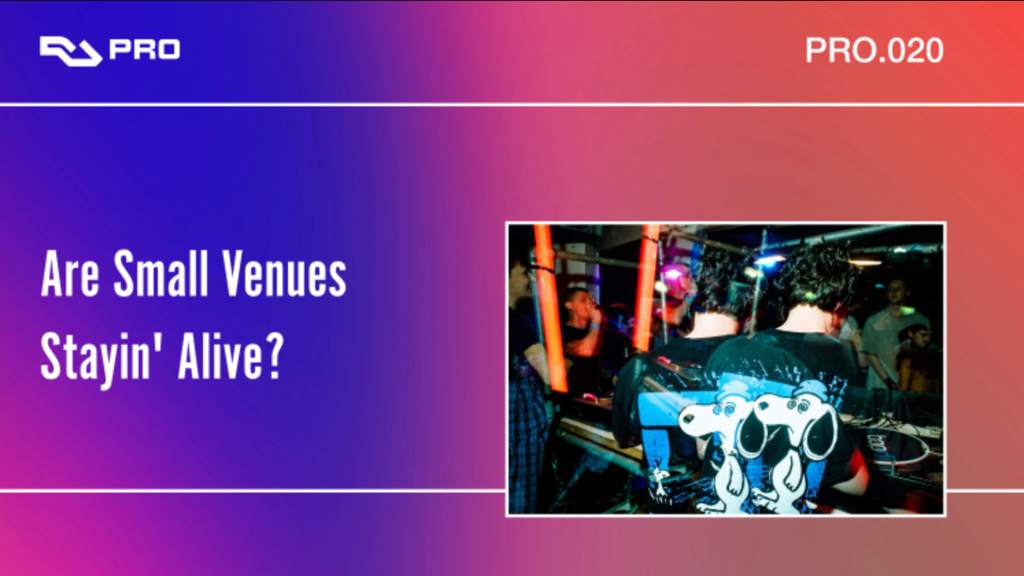Published
Thu, Apr 18, 2024, 08:00
- Our latest industry dispatch explores the economics behind independent venues.

Welcome to the RA Pro Newsletter: a bite-sized look at the trends and themes impacting businesses in the electronic music industry. Sign up to the full newsletter to get early access to each release and read all archived editions.
Underground electronic music spaces have long operated on the fringes of economic viability. In today's recessionary climate, their precarious situation is setting off alarm bells. Ask most independent entities (live music halls, small clubs, DIY spots) and they'll tell you how hard it is to exist with meagre financial margins amid soaring operating costs.
In the UK, where a cost-of-living crisis has hit businesses across the board, the hunt is on for ways to help. At a parliamentary meeting last month, Mark Davyd, CEO of Music Venue Trust (a charity that advocates on behalf of small venues), suggested a token fee on tickets at big UK arenas and stadiums. This income could be used to set up a support fund for grassroots operators, enabling them to "take risks with their programming and really give artists the first step on the ladder they need," Davyd explained.
That same week, Brownswood Recordings boss Gilles Peterson penned an op-ed for The Guardian about how to save "British nightlife from collapse." Inspired by the collective ownership model of Germany's football clubs, the Worldwide FM founder said ticket prices could be more affordable if venues were similarly structured. He concluded by promising to play more small UK clubs in an effort to "bring in audiences old and new in."
This discussion might be UK-centric, but given the extent of rising inflation and artist fees worldwide, these issues apply to most regions. Big-moneyed competition is another problem. As more clubbers opt for high production value and experiential events such as festivals, smaller clubs are at a disadvantage, which is why they need prominent artists, like Peterson, to draw a crowd. Underground electronic music might be reaching more ears thanks to streaming services and TikTok influencers, but it's not showing in venue audience growth just yet.
Perspectives on the ground
Mike Grieve is managing director at Sub Club, a Glasgow institution that's been running since 1987. He told Resident Advisor that UK electronic music scenes face "a very real existential threat."
"Ticket sales and drink sales are pretty much the only income streams, and in the marketplace where we operate, the margins are extremely tight," he said. "For instance, the price of entry to Sub Club hasn't really changed since the '90s, when our Subculture resident nights were £8 or £10, with guest DJ nights coming in at £12. Now, we generally charge £10, £12 or £15 for Subculture, with only occasional exceptions. During that same period, the cost of bringing visiting DJs to the club has risen dramatically. Our drink prices are less than an average city centre bar, yet our staff costs are significantly higher as we need a full team of stewards at all times. Add the cost of PR, marketing and advertising, and it's obvious that our margins are being squeezed from both ends."
It's a similar story on the other side of the world. Seoul-based DJ FFAN runs an underground club in the metropolis called Nyapi. He emphasised how higher operating costs are eating into venues' bottom lines.
"Here, it's common to visit two to three clubs in a night instead of staying at one for a long time, which makes it difficult for everyone to afford entrance fees," he told me. "As a result, many clubs have to rely heavily on accepting a lot of free guests and ticket revenue has plummeted. Most of the income now comes from alcohol sales, but clubs are struggling due to the rising cost of alcohol and the decrease in consumer purchasing power caused by inflation. Additionally, due to the increase in real estate prices, the rent for a 100-capacity space requires entrance fees from 500 to 700 people per month."
Grieve welcomed Peterson's community-ownership model, but noted it would be hard to legislate since each business will have different stakeholders. Still, "widening the ownership model and introducing cultural levies of some sort would seem like the only way that such enterprises can properly thrive in the future." Many clubs in Seoul tend to have multiple ownership rather than individual ownership and NYAPI is no exception. "Multiple ownership structures undoubtedly bring a larger scale, leading to increased diversity in all directions," FFAN echoed.
Both also urged policymakers to consider exempting small venues from value-added tax (VAT), noting how it would make programming more affordable.
In case you missed it: important industry news
• Why British nightlife is shutting down—taking with it all its magic and messy glory
• UK nightlife coalition launches drug-safety initiative, Safer States
• Chechnya to ban music not between 80 and 116 BPM
• Same Old Song: Private Equity Is Destroying Our Music Ecosystem
 Both also urged policymakers to consider exempting small venues from value-added tax (VAT), noting how it would make programming more affordable.
Both also urged policymakers to consider exempting small venues from value-added tax (VAT), noting how it would make programming more affordable.